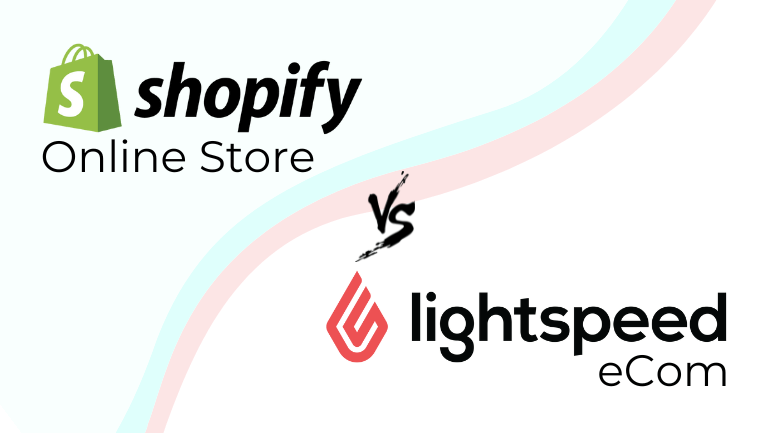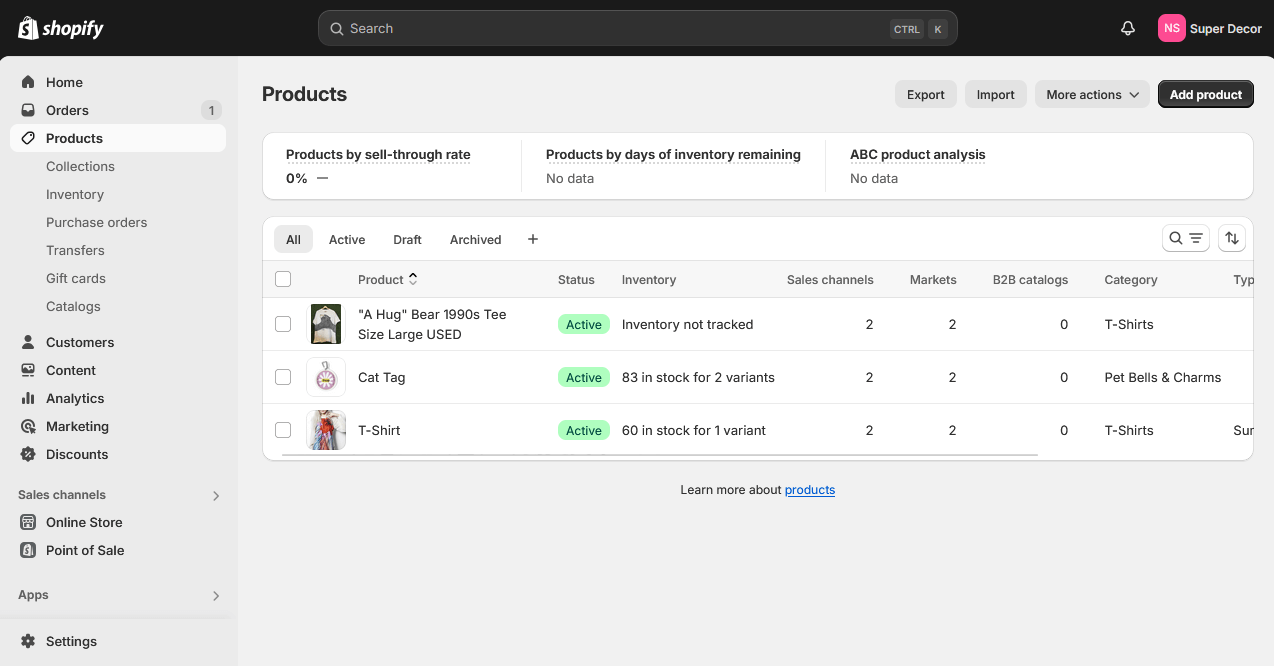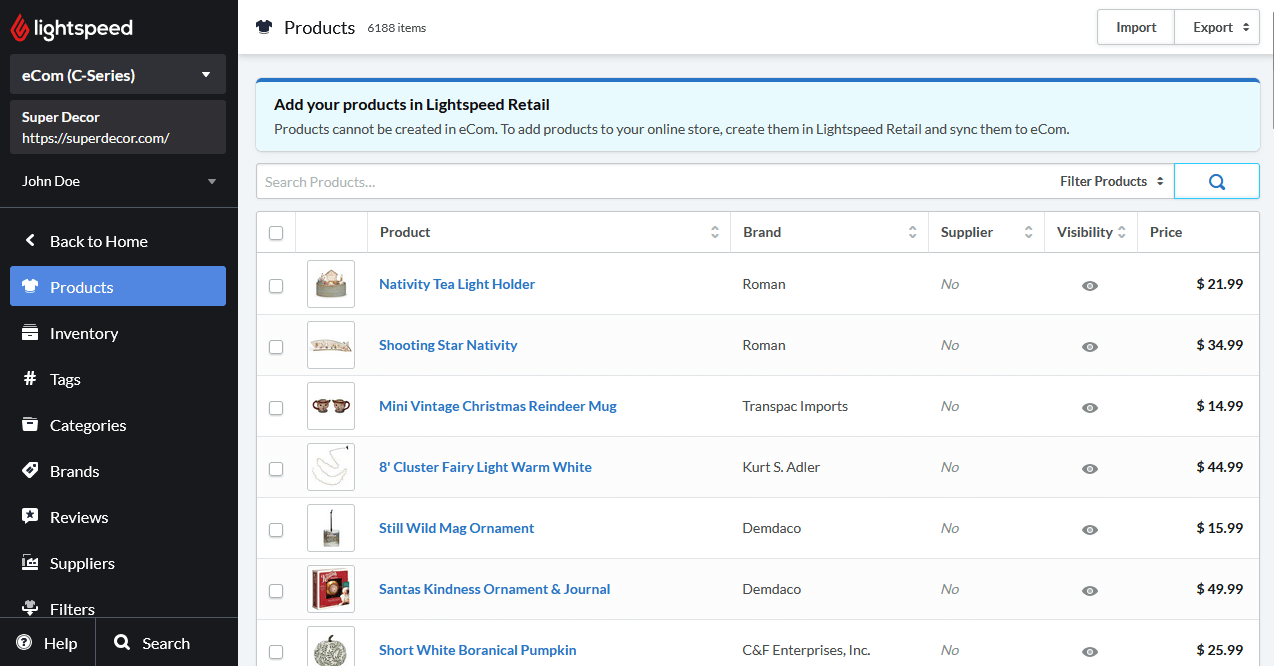
If you’re considering an eCommerce platform for your business, you’ve probably come across Shopify Online Store and Lightspeed eCom. Both are popular solutions, but they cater to slightly different needs. In this post, we’ll break down their features, strengths, and weaknesses to help you decide which platform might suit your business better.
Overview
Shopify Online Store

Shopify Online Store
Shopify Online Store is one of the most popular eCommerce platforms globally, powering millions of online businesses. It’s a fully hosted solution, meaning Shopify handles the technical side of running a website—like hosting, security, and updates—so you can focus on selling. Shopify is known for its user-friendly interface, diverse selection of themes, and extensive app ecosystem.
Whether you’re a small business just starting out or an established brand aiming for global reach, Shopify offers tools that make it easy to scale and adapt as your business grows. It’s a versatile platform that supports both online and in-person sales through its Shopify POS system.
Lightspeed eCom

Lightspeed eCom
On the other hand, Lightspeed eCom is part of the larger Lightspeed ecosystem, which provides comprehensive solutions for retail, hospitality, and eCommerce businesses. While Shopify is often favored for pure online businesses, Lightspeed eCom is an ideal choice for retailers who already use Lightspeed POS. The seamless integration between Lightspeed eCom and its POS system allows businesses to manage inventory, sales, and customer data across both online and physical stores effortlessly.
It’s particularly suited for industries like fashion, sports, and specialty retail, where managing complex product catalogs and variants is crucial. Lightspeed eCom takes a more streamlined, all-in-one approach, making it an excellent option for retailers who value simplicity and efficiency.
Key Features Comparison
| Shopify Online Store | Lightspeed eCom | |
|---|---|---|
| Ease of Use | Beginner-friendly with an intuitive interface and drag-and-drop builder. | Slightly steeper learning curve, but straightforward if you’re familiar with Lightspeed POS. |
| Customization | Extensive themes (paid & free) and customization options. | Limited template choices with fewer customization capabilities. |
| POS Integration | POS available but as a separate system; requires Shopify POS subscription. | Built-in integration with Lightspeed POS, making it seamless for retailers with physical stores. |
| App Ecosystem | Over 8,000 apps in the Shopify App Store, covering everything from SEO to marketing automation. | Fewer apps available; most core functionality is built-in. |
| Pricing | Starts at $25/month + transaction fees unless using Shopify Payments. | Starts at $39/month, but pricing varies based on Lightspeed’s bundled POS and eCom plans. |
| SEO & Marketing | Strong SEO features, email marketing tools, and integration with major advertising platforms. | Decent SEO features but less emphasis on marketing tools compared to Shopify. |
| Scalability | Highly scalable, suitable for small startups and enterprise-level businesses alike. | Better suited for small-to-medium businesses, especially brick-and-mortar retailers expanding online. |
| Customer Support | 24/7 support via chat, email, and phone; extensive help center. | Support available during business hours; less extensive self-help resources. |
(The information and figures in this table are for reference purposes only and may be subject to change in the future)
Strengths of Shopify Online Store
Global Reach
Shopify has a significant edge when it comes to selling internationally. The platform supports multiple currencies and languages, making it easier to cater to a global audience. It even offers built-in tools like currency conversion and geo-targeted storefronts to enhance the shopping experience for customers worldwide. If you’re dreaming big and want to take your store across borders, Shopify has everything you need to make that happen.
Customization Options
Shopify is a playground for creativity. Whether you’re tech-savvy or a complete beginner, you’ll find ways to make your store look and feel exactly how you want. Shopify offers a wide variety of professionally designed themes that cater to every industry. Plus, for those who want more control, the Liquid template language allows advanced users or developers to create custom designs and functionalities. This flexibility means your store doesn’t have to look like anyone else’s—it can truly reflect your brand’s personality.
Scalability
Shopify isn’t just for small businesses or startups; it’s built to grow with you. Whether you’re selling 10 products or 10,000, Shopify can handle it. Their hosting is robust, ensuring your store runs smoothly even during high traffic events like Black Friday sales. Additionally, Shopify Plus, the enterprise version, caters to larger businesses that require advanced tools and dedicated support. So no matter where your business is today, Shopify has the infrastructure to support where you want to be tomorrow.
24/7 Support
Let’s face it, running an online store can come with unexpected challenges. That’s where Shopify’s 24/7 customer support really shines. Whether it’s 3 a.m. or a busy holiday weekend, there’s always someone available to help. Their support team is known for being knowledgeable and patient, guiding you through technical issues or providing advice on using the platform’s features. On top of that, their community forums and extensive documentation are excellent resources if you prefer to troubleshoot on your own.
Strengths of Lightspeed eCom
Seamless Integration with POS
Lightspeed eCom is the natural choice if you’re already using Lightspeed POS for your physical store. The integration between the two is smooth and automatic, syncing inventory, pricing, and sales data in real-time. This means you can manage both your online and offline stores from one centralized system without juggling multiple tools or worrying about discrepancies. For retailers with a strong in-person presence, this is a game-changer.
Tailored for Retailers
Lightspeed eCom is designed with retailers in mind. Its features cater specifically to industries like apparel, sports equipment, and even restaurants. For example, it handles complex inventory management for businesses with a wide range of products or variants exceptionally well. If you’re a retailer looking to expand your operations online, Lightspeed eCom simplifies the transition.
All-in-One Solution
One of Lightspeed’s biggest advantages is its bundled approach. You’re not just getting an eCommerce platform; you’re getting a complete retail management solution. From POS to inventory tracking, customer management, and even analytics, Lightspeed covers all the bases. This eliminates the need for multiple third-party apps, saving time and reducing costs.
Simpler for Small Businesses
While Shopify can sometimes feel overwhelming due to its wide range of options, Lightspeed eCom offers a more streamlined approach. For smaller businesses or those new to eCommerce, this simplicity can be a relief. Everything you need is built-in, and you won’t spend hours navigating an app store to piece together the functionality you need.
Which Platform Should You Choose?
Choose Shopify Online Store if:
You’re looking for a platform that prioritizes flexibility, scalability, and a global reach. Shopify is perfect for businesses aiming to grow quickly and sell across multiple channels, including social media, online marketplaces, and physical stores (with Shopify POS). It’s also ideal if you need advanced marketing tools or a large app ecosystem to customize your store’s functionality. However, keep in mind that Shopify’s reliance on apps might increase your monthly expenses.
Choose Lightspeed eCom if:
You already have a physical store powered by Lightspeed POS and want to add an online component without disrupting your existing workflow. Lightspeed eCom is particularly suited for retailers with specialized needs, such as managing intricate inventory or syncing multiple sales channels. It’s not as feature-rich as Shopify for pure online businesses, but it’s a solid choice for brick-and-mortar retailers looking to go digital.
Final Thoughts
Both Shopify Online Store and Lightspeed eCom offer powerful tools, but they shine in different areas. Shopify is the go-to for ambitious online businesses looking for advanced features and scalability. Lightspeed eCom, on the other hand, excels for retailers who want to bridge the gap between their physical stores and online presence.
Evaluate your business needs, consider your budget, and think about your long-term goals before making a decision. And remember, no matter which platform you choose, success lies in how well you utilize its features to enhance your business.
If you’re also managing physical stores or considering point-of-sale solutions, you might want to check out our detailed comparison of Shopify POS and Lightspeed POS to ensure a seamless integration between your online and offline operations.